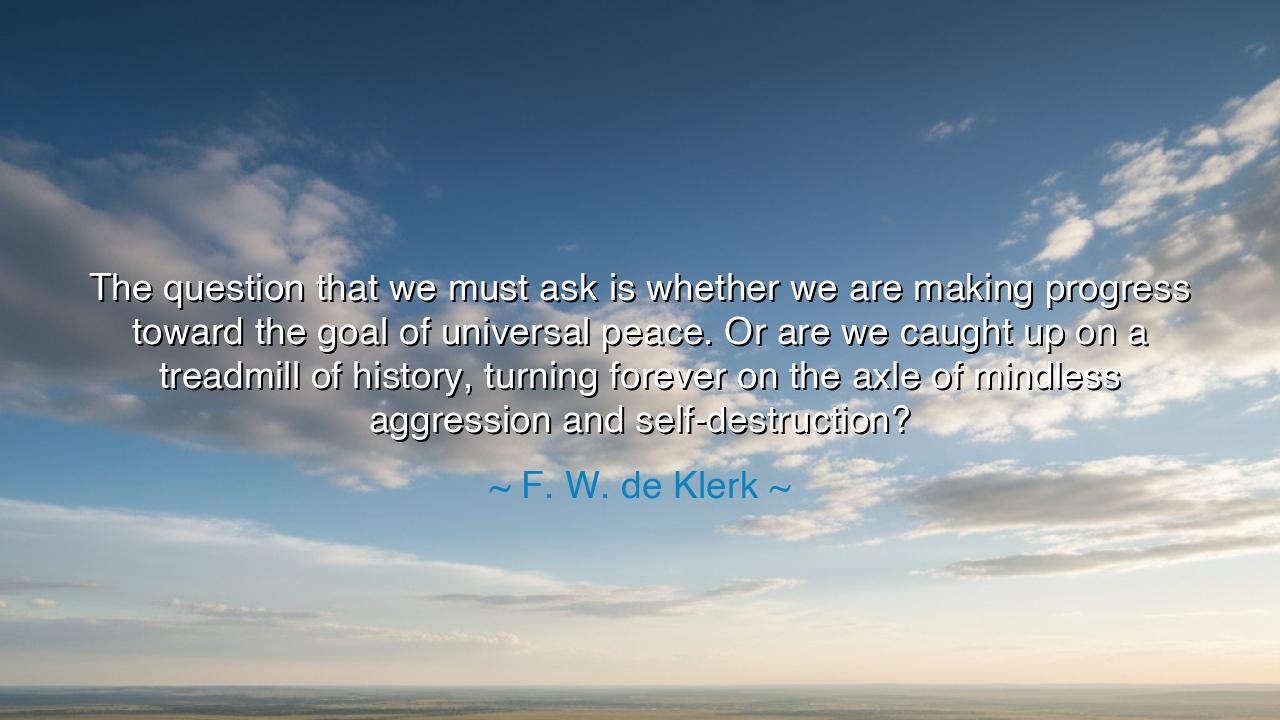
The question that we must ask is whether we are making progress
The question that we must ask is whether we are making progress toward the goal of universal peace. Or are we caught up on a treadmill of history, turning forever on the axle of mindless aggression and self-destruction?






In the solemn tone of one who has looked upon the triumphs and the tragedies of nations, F. W. de Klerk, the last president of apartheid-era South Africa, once asked: “The question that we must ask is whether we are making progress toward the goal of universal peace. Or are we caught up on a treadmill of history, turning forever on the axle of mindless aggression and self-destruction?” These words are not the rhetoric of a politician, but the reflection of a man who stood at the turning point of history—one who had witnessed both the abyss of hatred and the fragile dawn of reconciliation. In this statement, de Klerk speaks not to a single nation, but to humanity itself. His voice echoes the ancient prophets who warned that without wisdom, progress becomes illusion, and that the wheel of history spins endlessly when the heart remains unchanged.
To understand the origin of this quote, one must look to de Klerk’s own life and the monumental moment he helped shape. In 1990, amid the divisions of apartheid, he made the fateful decision to free Nelson Mandela and dismantle the system of racial segregation that had defined South Africa for decades. It was a choice that demanded not only political courage but moral awakening. De Klerk had seen how oppression corrodes the oppressor as much as it wounds the oppressed, how aggression—whether born of fear or ambition—always returns upon its maker. In his later reflections, he pondered the state of the world and saw that the same forces of division and violence that once threatened his own land continued to haunt humankind. His question—are we progressing or repeating?—is both confession and challenge.
In his imagery of the treadmill of history, de Klerk captures the tragic cycle that has plagued civilizations since the dawn of time. Empires rise and fall, each claiming to bring peace, only to descend once more into war, conquest, and decay. From the battlefields of ancient Mesopotamia to the trenches of Europe, humanity has often mistaken power for progress, invention for enlightenment. The wheel turns faster, yet the destination remains unchanged. The axle of mindless aggression grinds onward, fueled by greed, fear, and pride. De Klerk’s words remind us that history, without reflection, is not a teacher but a trap. Unless we learn to master our instincts, we will remain enslaved by them—forever moving, never arriving.
The ancients, too, spoke of this endless cycle. The Greek tragedians called it hubris—the arrogance that blinds kings and nations alike, leading them toward ruin. The philosophers of the East saw it as samsara, the wheel of suffering that binds all beings until they awaken to compassion. De Klerk’s question is born of this same eternal wisdom: can humanity awaken? Can we step off the treadmill and walk a new path, one guided not by dominance, but by understanding? He does not offer an easy answer, for he knows that peace is not a momentary treaty but a transformation of spirit. True peace begins within the soul of each person who dares to forgive, to listen, and to see the humanity in another.
Consider the story of South Africa itself, the land from which de Klerk spoke. For centuries, it was a place divided by race and rule, its people bound in bitterness and inequality. Yet, when the end of apartheid came, the world witnessed something astonishing: instead of collapsing into vengeance, the nation sought reconciliation. Through the Truth and Reconciliation Commission, led by Archbishop Desmond Tutu, victims and perpetrators sat in the same room—not to forget, but to understand. It was an imperfect, painful process, yet it broke the rhythm of hatred and began to turn the wheel of history in a new direction. This was the living embodiment of de Klerk’s question answered: that peace is possible, but only when humanity dares to face its own reflection.
And yet, his warning remains urgent today. The treadmill of history still turns—in the conflicts that ravage nations, in the exploitation of the weak by the powerful, in the endless chase for dominance disguised as progress. We invent new machines, new weapons, new ideologies, yet the same old instincts whisper beneath them all. De Klerk’s words ask us to pause, to measure our steps. Are we truly advancing toward universal peace, or merely running faster in the same circle? It is a question that every generation must answer for itself, and each person must answer in the quiet of their own conscience.
So, let this be your lesson, O seeker of peace: progress is not motion, but transformation. The world changes only when the heart does. The path to universal peace is not paved with weapons or decrees, but with compassion, humility, and dialogue. Speak with your enemies as de Klerk once spoke with Mandela—not in surrender, but in the courage to seek understanding. Refuse the treadmill of vengeance; step instead onto the path of renewal. For history will turn forever unless we, the makers of history, choose to rise above it. And when we do, when the wheel finally stops and peace takes root in every soul, then shall humanity truly move forward—not as conquerors, but as keepers of the light.






AAdministratorAdministrator
Welcome, honored guests. Please leave a comment, we will respond soon